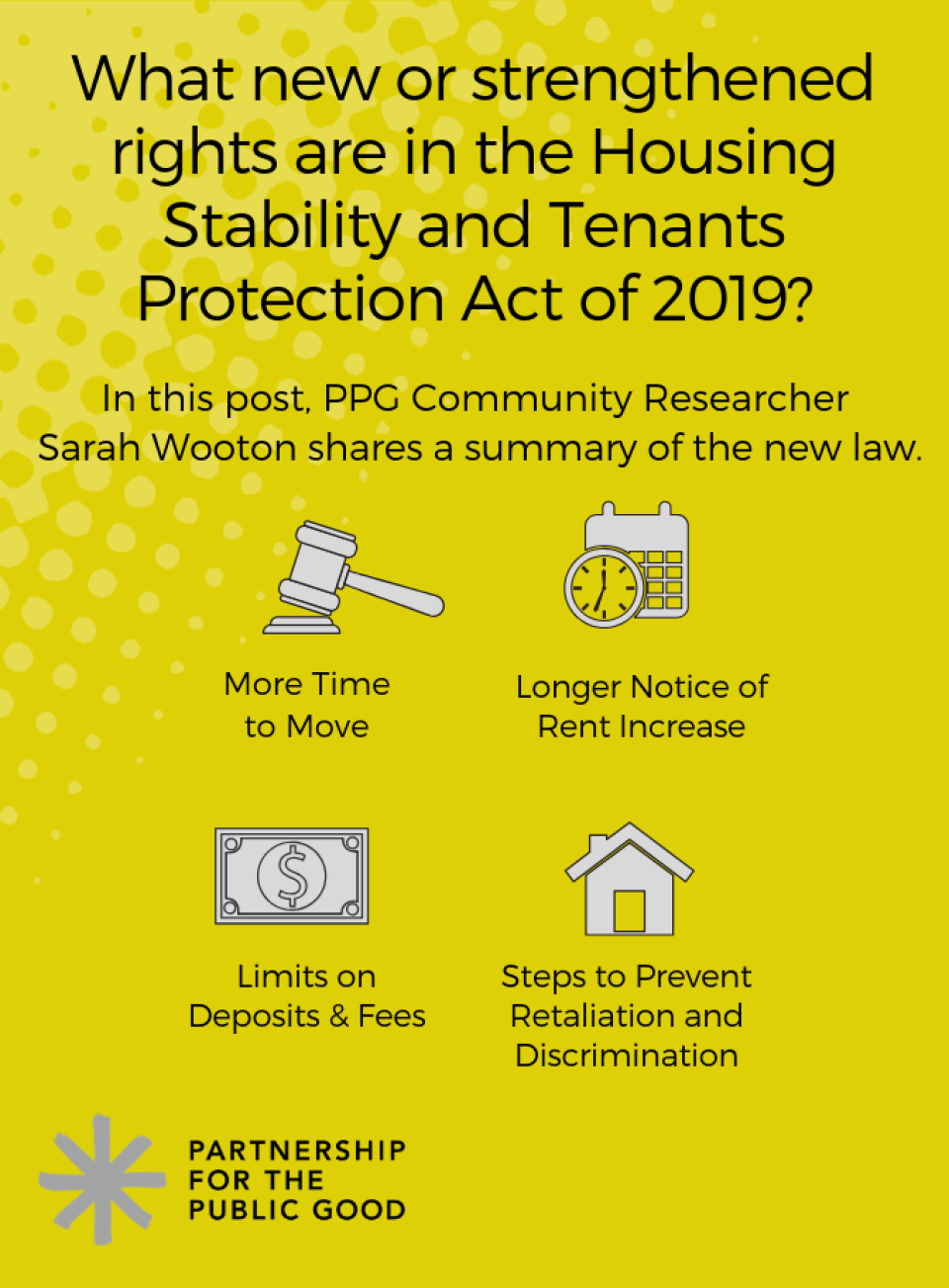News Take Action
New York State Passes Major Tenant Protection Reforms
| Date: | July 9, 2019 |
| Share: |

June 14 marked a historic day for tenants in New York State. It was the day Governor Cuomo signed the “Housing Stability and Tenants Protection Act of 2019” (HSTPA) into law. Many know that this law secures rent regulation for thousands of tenants in New York City and allows municipalities statewide to adopt rent regulation policies. Fewer people know, however, that this law significantly expands rights for all New York State tenants—on everything from security deposits, to eviction processes, to lease changes.
In this post, PPG Community Researcher Sarah Wooton provides a summary of the new law.
More Time for Tenants: The new law extends the timeline for tenants facing eviction. In PPG’s soon-to-be-released study of evictions in the City of Buffalo, we found that most eviction cases were for non-payment of rent. When a tenant is unable to pay rent and their landlord wants to evict them, the landlord must demand the rent. The HSTPA mandates that this demand must now be in writing and must give the tenant 14 days to come up with the rent (a change from 3 days).
If the tenant is still unable to pay and does not move out, the landlord can file with the court for an eviction case. The tenant will be served papers with a court date. The court date will now be 10 days from the service date (a change from 5 days). This a major improvement for tenants because it gives them critical time to gather funds— whether from family, friends, service agencies—and avoid eviction.
If a tenant is still unable to pay the back rent, the judge may issue a warrant of eviction on the court date. Warrants will now be executed after 14 days (a change from 72 hours). If the tenant gathers the owed rent before that 14 days is up, they can now deposit it with the court, and they will not be evicted. If the tenant still doesn’t have the funds, these additional days give the tenant some much-needed time to look for a new home, pack, and move.
In any eviction case, the tenant or landlord can ask the court to reschedule the case (an adjournment). In Buffalo, landlords are often granted an adjournment, but tenants often are not. The new law gives both the tenant and landlord a right to a 14-day adjournment. This is important for tenants for many reasons. They may be unable to attend the initial court date due to a medical emergency, disability, or other circumstance. They may also need extra time to gather receipts, photos or other evidence for their case.
Earlier notice for Tenants: Tenants will now receive additional notice if their landlord is increasing their rent 5% or more or are refusing to renew their lease. If a tenant has lived in a unit for less than a year, they must get 30 days’ notice. If they’ve lived in the unit for more than one year, but less than two years, they must get 60 days’ notice. If they’ve lived in the unit for more than two years, they must get 90 days’ notice. This extra time is critical for tenants to find a new unit that is both suitable and affordable, to pack their belongings, and to move.
Limits on Security Deposits and Fees: Prior to this law, landlords could charge whatever they wanted for the security deposit and other fees. Under the HSTPA, application fees are now prohibited. Background check fees and credit check fees are limited to the actual cost of the service or $20, whichever is less. Security deposits are now limited to one month’s rent. Restricting these charges keeps housing affordable to tenants.
Landlords must now return tenants’ security deposits (or provide a written itemized description of damages for which the security deposit will be used to fix) within 14 days (a change from a “reasonable amount of time,” usually understood as 30 days) of the tenants’ departure. If a landlord keeps the security deposit and does not provide a written statement within 14 days, the landlord loses their right to keep any portion of the deposit. For tenants, receiving the security deposit back in a timely manner is important because the funds can help them with moving costs.
Strengthens Protections Against Retaliatory Evictions: A retaliatory eviction is when a landlord tries to evict a tenant because the tenant did something that they are legally allowed to do. For example, a tenant is concerned about mold in their apartment, so they call the health department. If the landlord tries to evict the tenant because the tenant called the health department, it is a retaliatory eviction. With the new law, there is a presumption of retaliation for one 1 year (a change from 6 months) after a good faith complaint by the tenant. This means that the court will assume that the eviction is retaliatory unless the landlord proves otherwise.
Non-Discrimination: The new law bars landlords from rejecting prospective tenants due to a tenant’s history in landlord-tenant court. The Attorney General can bring cases against landlords who do this. The civil penalty is $500-$1000 for each violation.
Unlawful Eviction: The law establishes unlawful eviction (e.g. changing the unit’s locks without bringing an eviction case) as a misdemeanor crime. The civil penalty for this crime is $1,000-$10,000 per violation.
This news post was written by Sarah Wooton, Community Researcher at PPG.
For a full list of the changes, see the Sponsor Memo on the Housing Stability and Tenant Protections Act of 2019 bill page.